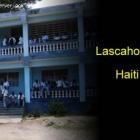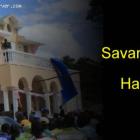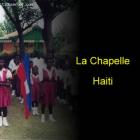ADVERTISEMENT
Independence - Haiti Observer Blog
Independence, Haiti Observer Blog. Read the following articles about Independence
Vertierre or Vertieres, Pivotal in Haiti Independence
Saint Domingue on island of Hispaniola was once the most lucrative part of French colony on the Caribbean island from 1659 to 1809. But a slave revolt in which the battle of Vertierre or Vertieres was pivotal ended the colonization. With support of British government ended the French rule in Saint Domingue and the French were forced to withdraw themselves from this European colony in 1803.
The decisive encounter between General Rochambeau of the French army and the separatist British supported leader General Jean-Jacques Dessalines is known as 'War of Vertières'. General Dessalines who was born as a slave led the struggle against the French. The British weakened the French by naval blockades and supplied weapons and ammunitions to General Dessalines. Sensing danger, Rochambeau shifted French headquarters from Port-au-Prince to Cap Français. Dessalines went on capturing places one after another like Jacmel, Cayes, Jérémie and Léogane. When the French Commander surrendered himself on October 3 at Port-au-Prince, stage for physical attack was set on Le Cap Français.
Haitian President Alexandre Petion, gens de couleur libres
Born a member of the gens de couleur libres, Alexandre Sabes Petion (1770 - 1818) began life between two worlds. It is a dichotomy he would continue, further marking his legacy as an instrumental force behind the struggle for independence of two lands, his own beloved Haiti, and the republic of Gran Colombia.
Alexandre Petion began his career, after an expensive education in France, by joining the fight to force the British out of Saint-Domingue between 1798 and 1799. He would subsequently fight on the side of the mulattos against Toussaint L'Ouverture and the blacks, and was exiled to France when the rebellion ended; he returned soon after with General Leclerc and his assemblage of warships and troops. In 1802, he joined the nationalist force and gave his support to Jean-Jacques Dessalines, the future proclaimer of the Haitian Independence and self-declared ruler for life of the newly formed country.
What an irony, Haiti, first to abolish slavery, now one of the highest countries in modern day slavery
Haiti, the first black-led republic in the world, gained independence in 1804 as part of a successful slave revolution. The slaves in Saint-Domingue revolted and fought against one of the most sophisticated army at the time because they believe that all man are equal and that slavery should be abolished.
Now how can you understand this today. An Australian Foundation came up with a report recently listing Haiti as the second country with the highest per capita globally engaging in modern day slavery after India.
According to the report, about two percent of the Haitian population are living as forced child labor known as "restavec"
Frederick Douglass, a Friend to Haiti
Frederick Douglass, born into slavery in 1818, escaped his slave master and became a writer, speaker, and public servant. He was beaten from child- into early adulthood by his slave master. After one beating too many, he decided he was never going to tolerate another. When the slave owner tried to beat him, Frederick ferociously fought back.
By 1893, he was the leading black intellectual of his era, having penned many autobiographies detailing his life as a former slave. He put the lie to the argument slaves did not possess intelligence to lead their own lives with all the rights accorded to white citizens.
Haiti's Fraudulent Independence Debt
Although Haiti gained its independence from France and became the first black-led republic globally in 1804, foreign interests have continued to meddle in the island's affairs. France never forgave Haiti for defeating them and demanded 150 million francs as compensation for France's forfeiture of real estate and slaves. If Haiti didn't comply, France threatened to re-instate slavery.
Repayment of the debt ruined Haiti's economy, a major factor in its poorest-nation-in-the Western-Hemisphere status. Well over a century passed before Haiti cleared its debt to France in 1947. Millions upon millions of interest dollars protracted repayment to French banks, who lent Haiti money to pay off interest on the principal. In 1922, the U.S. assumed part of Haiti's debt that France had reduced to 90 million francs. In demanding compensatory damages, France violated its Declaration of the Rights of Man which states: "Men are born free and remain free and equal in rights."
Haiti National Flag Symbol of Might, Endurance, and Triumph
On May 18, 2013, the Haitian National Flag will celebrate 210 years of independence from French foreign oppression. The history of the flag dates back to 1803 when--in a defiant move--revolutionary leader, Jean Jacques Dessalines, desecrated the French flag. He removed the white-center panel of the tri-color and created the first national Black Republic flag.
The lore of the Haitian National Flag is rich in symbolism. The most popular meaning of the blue-and-red horizontal panels is representation of skin tones: blue for black and red for white. When Alexandre Petion became the next leader of Haiti, he added a unifying element, the nation's first coat-of-arms. Situated within a small, white square, fusing blue-and-red side-by-side panels, a tableau reveals the history of slavery, the fight to end it, and its ultimate abolishment.
Plaine-du-Nord and Saint Jacques Fiesta
Haiti's Nord Department is in the northern most part of the country. It is where the small municipality of Plaine-du-Nord, often referred to as Plèn dinò in Creole, is located. It is considered an essential part of Haitian history and is one of the centres of the voodoo religion in the country.
Plaine-du-Nord is the historical site where the battle between Haiti's French colonizers and African slaves who worked in plantations began. This led to Haiti's independence from its colonizers and the freedom of slaves who became the very first official Haitians. The municipality is currently considered as the country's Pilgrimage Festival capital, which attracts thousands of worshippers and foreign visitors yearly. One of Plain-du-Nord's biggest, most important festivals is the Saint Jacques Fiesta, which is celebrated every 25th of July. It is then followed by the Saint Anne celebration a day after. Pilgrims usually stay for 15 days in the municipality during these festivities in order to offer food to the less fortunate, light candles, and donate money to the local churches.
Hillary Clinton Praises Haiti on 209th Independence Anniversary
U.S. Secretary of State, Hillary Clinton, developed a blood clot after falling in her home in early December. Clinton was nursing a stomach-flu virus, and had become dangerously dehydrated. The fall resulted in a brain concussion. As part of follow-up treatment, she was given a MRI, a diagnostic procedure that revealed a blood clot wedged between her skull and brain. Blood-thinner prescriptions have been administered to her to remove the clot.
Secretary Clinton was scheduled to address a congressional hearing on the Benghazi assault, which took the life of Chris Stephens, U.S. Ambassador to Libya. Clinton accepted full responsibility for the assault, but the Obama administration does not find her at fault. However, right-wingers doubt her integrity, believing she is using her condition to avoid testifying.
Happy Haiti Independence Day, this Pumpkin soup (Soup Joumou) is for you
As a reminder, Independence day in Haiti is an important holiday. we are fortunate to celebrate two important events on this day: On January 1, Haitians all over the world celebrate both New Year's Day and Independence Day.
This little nation made history on January 1, 1804 by becoming the first Black Country to gain its independence. At the same time we change the name of the country back to its original name "Ayiti", name given by the original inhabitants and before Christopher Columbus so called discovered the Island in 1492. At that point the island was named "Hispaniola"
The Battle Of Vertieres
The battle of Vertieres near Cap-Haitian was motivated by slaves who hat the condition under which they have been living.
Napoleon was confident that slavery would be reestablished in Saint-Domingue. General Rochambeau, who succeeded Leclerc as commander of the French army in Saint-Domingue, started implementing a series of atrocities including mass hangings and drowning of slaves suspected to be involved in insurrections.
Dessalines relentlessly attacks one town after another. He started in the South of the Country with Cayes, then Jacmel, Léogane, Jérémie, Saint Marc and Port-au-Prince. These actually set the stage for the assault on le Cap Français in the last great battle of independence in Vertieres.
Our objective is to share with you news and information about Haiti and the people of Haiti. Traditions, habits and the way we were or grew are alive in this site. We highly recommend that you Subscribe to our Newsletter and also share with us some of the things that are memorable and made us unique people.


 Haitian Creole Translation
Haitian Creole Translation  Lascahobas, Haiti
Lascahobas, Haiti  The Town of Savanette, Haiti
The Town of Savanette, Haiti  La Chapelle, Haiti
La Chapelle, Haiti  Haiti tech Summit
Haiti tech Summit